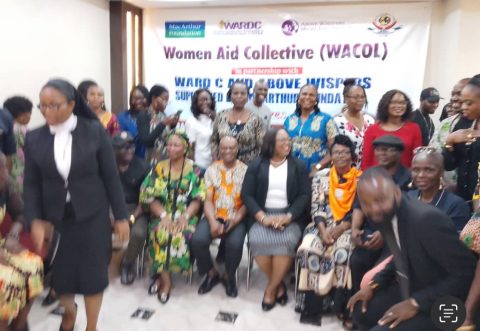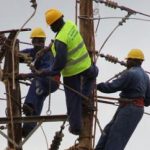WACOL, Workshop Participants Raise Concern Over Corruption In Handling Gender-Based Violence Cases In S/East
Featured, Latest Headlines, News Across Nigeria Monday, December 9th, 2024
(AFRICAN EXAMINER) – A Non governmental body, Women Aid Collective (WACOL), Civil Society Organizations (CSOs), Community-Based Organizations (CBOs), and media professionals in the South-East Zone of Nigeria have raised concern over the high level of corruption in the area in handling Gender-Based Violence (SGBV) cases.
They posited that the ugly trend in the geo political zone has remained a clog in the wheel of progress of dealing with the social malady.
The groups stated this weekend in Enugu during a – 2 day workshop put together by WACOL, in partnership with WARD C and Above Whispers, supported by MacArthur Foundation.
Participants at the programme which was organized to build their capacity, harped on the need for Stakeholders to strengthen accountability, promote justice, and empower communities to fight the social malady in the area.
They urged the Judiciary and Law Enforcement Agencies to adopt transparent and survivor-friendly processes, ensure timely prosecution of SGBV cases, and root out corruption within their systems.
Also, they called on Government Agencies to prioritize the fight against corruption in SGBV cases, allocate resources for survivor support, and hold erring officials accountable.
A communique issued at the end of the workshop, read thus: “We, the participants, resolved to strengthen accountability mechanisms:
Advocate for the full implementation and enforcement of the Violence Against Persons (Prohibition) Act, the Child’s Right Act and relevant state laws, ensuring corruption-free processes.
“Monitor and report misconduct within the justice system and demand accountability from law enforcement and judicial officers.
“Enhance Survivor Support Services: Partner with stakeholders to establish or strengthen support services, including legal aid, psychosocial counseling, and safe shelters, ensuring these services are accessible and free of corruption.
“Develop survivor-centered approaches that prioritize the dignity, privacy, and safety of survivors.
.“Build Capacity of Key Stakeholders:
Train CSOs, CBOs, and media practitioners on anti-corruption frameworks, investigative reporting, and survivor-sensitive reporting to enhance their effectiveness in tackling corruption in SGBV-related cases.
.“Equip community leaders and service providers with tools to identify and address corruption in SGBV cases and demand accountability and support survivors effectively.
.“Training and retraining of law enforcement agents and Judicial officers on issues surrounding corruption in SGBV cases.
.“Collaboration and Networking:
Foster collaboration among CSOs, CBOs, and the media to create a unified front against corruption in SGBV cases.
“Establish a South East GBV Accountability Network (SEGBVAN) comprising CSOs, CBOs, and the media to share resources, monitor cases, and advocate for systemic change.
“Leverage the Media for Advocacy and Transparency:
Use traditional and digital media platforms to highlight cases of corruption and advocate for systemic reforms.
.“Promote investigative journalism to expose corrupt practices and amplify survivors’ voices without compromising their privacy.
.“Enforcement Agencies to adopt transparent and survivor-friendly processes, ensure timely prosecution of SGBV cases, and root out corruption within their systems.
.“Communities and Individuals to break the culture of silence, report cases of SGBV and corruption, and support survivors in their pursuit of justice.
.According to them, “Donor Organizations should support initiatives addressing corruption in SGBV cases, including funding for capacity building, survivor support, and advocacy programs.
Founder/Executive Director of WACOL, Professor Joy Ezeilo, a Senior Advocate of Nigeria (SAN), in her remark, stated that the training was designed to equip civil society organizations (CSOs), community- based organizations (CBOs), and media professionals in the Southeast region with the knowledge and skills to identify, address, and prevent corruption in SGBV cases.
She told the participants that “the workshop strengthens your capacity to recognize and challenge corrupt practices, you can contribute to a more just and equitable society.
“It emphasizes a survivor-centred approach, ensuring that responses to SGBV are both just and sensitive to the needs of those affected. By exploring how corruption contaminates the reporting, investigation, and prosecution of SGBV.
. “It seeks to raise awareness of the negative impact it has on survivors. This understanding is important in empowering stakeholders to take concrete actions to strengthen the integrity of systems meant to support survivors of SGBV, and to uphold the rule of law” she added.
“SGBV is a pervasive global issue that disproportionately affects women and girls, stressing that “corruption, often intertwined with power imbalances, can exacerbate SGBV by hindering justice, undermining prevention efforts, and creating opportunities for exploitation.”
The two day workshop, which featured various presentations by two officials of WACOL, Rev. Sister Freida Okafor (Esq) and Barrister Victor Obichukwu, came to a climax with the conduct of a mock tribunal attended by senior legal officials in Enugu state.
Related Posts
Short URL: https://www.africanexaminer.com/?p=99421






















